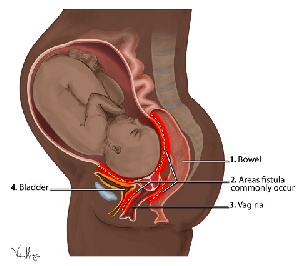 Obstetric Fistula (OBF) is an abnormal connection between the rectum and the vagina
Obstetric Fistula (OBF) is an abnormal connection between the rectum and the vagina
The occurrence of Obstetric Fistula (OBF) disease must be reported immediately to a health facility when noticed.
Victims should not try to manage it at home, Mrs Joycelyn Adii, the Brong-Ahafo Region Director, Department of Gender, said.
She said this during a community durbar held to mark the regional celebration of the international day to end OBF at Akrobi in the Wenchi Municipality of Brong-Ahafo Region.
The celebration, held under the theme: "Hope, Healing and Dignity for All”, was to sensitise the public about the nature and effects of the disease on victims, families and communities; its prevention and management.
The event was attended by over 270 people of diverse backgrounds including chiefs, queen mothers, departmental heads, women’s groups, health and other government workers, market women and farmers.
Under the circumstance, Mrs Adii said, if a woman’s labour became obstructed, she would endure days of painful, prolonged labour by which “her baby is unlikely to survive and if she survives, her body is literally broken by childbirth”.
She said affected women either leaked urine and faeces, leaving them socially isolated in most instances, adding that coupled with this psychological trauma, OBF also imposed enormous financial burdens on victims and their families.
Mrs Adii said many women are currently suffering from that heart-breaking and yet treatable condition and more were even thrown out of their husband's homes and sometimes the community.
She said OBF could be repaired through surgery and yielded a success rate of over 80 per cent when carried out by a trained provider with the proper medical equipment.
Mrs Adii expressed the hope that the celebration would help women to take the necessary steps to avoid the condition and urged those who needed repairs to come out boldly to be helped saying as “women are the centre of our homes anything that affects them can have a lot of implications on families and the community at large”.
Dr Osei Kuffour Afreh, a Deputy Director in-charge of Public Health, said the region recorded 10 cases in 2016 and victims are receiving medical care funded by the United Nation’s Population Fund (UNPFA).
He said the disease affected mostly teenagers between ages 12 to 18 in the process of delivery and appealed to health workers, particularly nurses to devote themselves to the health and well-being of their patients.